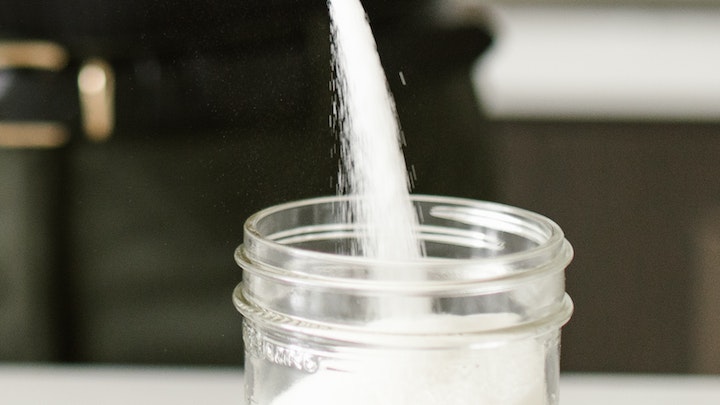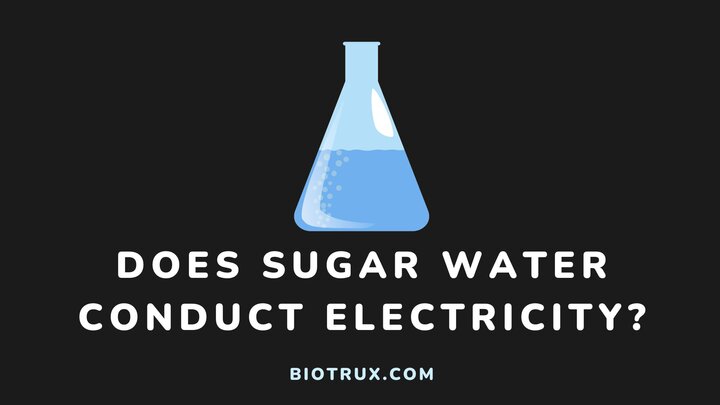Sugar water or solution does not conduct electricity. This is because sugar in its solid or liquid state ideally does not contain free or readily mobile ions.
When sugar dissolves in tap water or any non-distilled water, it shows a very tiny level of conductivity. However, this conductivity is no match for that of saltwater.
To better understand the concept of sugar water and its relationship with electricity, this guide will familiarize you with some of its physical and chemical properties.
From there, it will walk you through why sugar water is a poor conductor, instances that can make it conduct, and their real-life applications.
Properties of Sugar
- Sugar contains carbon, hydrogen, and oxygen atoms connected by covalent bonds.
- Its molecular mass is 342.30 g/mol.
- The chemical formula of sugar (sucrose) is C12H22O11.
- The molecules of sugar are naturally neutral.
- Sugar has a white and crystalline physical appearance and readily dissolves in water.
- The density of the sugar molecule is 1.587 g/cm3.
- The melting point of sugar is about 459K or 185 °C.
Is Sugar Water a Good Conductor of Electricity?

Sugar is a poor conductor of electricity. When it dissolves in water, they release hydroxyl groups (OH–) connected by a hydrogen bond. These groups are incapable of passing electrons to one another or conducting electricity.
Sugar molecules also remain stable thanks to the covalent bond connecting them. The unchanged state of this covalent bond means there is no room for the exchange of electrons, hence, conduction cannot occur.
When is Sugar Water Conductive?
Pure or distilled water is an insulator. The solution will not conduct electricity when sugar is dissolved in such water.
However, this is not the case for a sugar solution made from tap water. Tap water consists of impurities and salt (as a result of the treatment it undergoes).
These external factors increase the conductivity of ions in tap water by about 500 folds. Hence, when sugar is dissolved in such water, it will conduct.
In this scenario, it should be noted that it is not the sugar molecules doing the conducting, it is the tap water.
Why Does Salt Water Conduct Electricity Better Than Sugar Water?
Unlike naturally neutral sugar, salt is an electrolyte with an ionic bond. So when it dissolves in water (pure or treated), there is dissociation and attraction between opposite charges.
Hydrogen attracts chloride ions in the positive terminal while oxygen attracts sodium ions in the negative terminal. For ionic stability, sodium atoms must donate an electron to chlorine to become positively charged.
On the other hand, chloride ions will become negatively charged ions. This series of events results in the conduction of electric current in a salt solution.
Does Sugar Water Conduct Heat?
Sugar or sugar water is a poor conductor of heat. This is also because its polar molecules do not dissociate into mobile ions in water.
Uses of Sugar
As a poor conductor of electricity, sugar solution still has a variety of uses. Let’s see some of them:
- A dextrose solution combines dextrose (a glucose derivative) and water. It is majorly used in treating low blood sugar.
- It also acts as a preservative, sweetener, and antioxidant.
- Sugar cane extracts help in the manufacture of face masks or moisturizers.
- The honeycomb structure that forms the core of sugar cane is a major sustainable material that features electrical car panels.
- Sugar cane remnant (bagasse) also features in the production of electricity for sugar cane mills and refineries. Some factories even generate enough electricity for nearby towns.
- Sugar molasses also play a role in the production of acetone-butanol-alcohol.
- Ethanol consists of sugar and is a primary additive for automotive gasoline.
FAQs
Does solid sugar conduct electricity?
Solid sugar does not conduct electricity because of its strong covalent bond.
This results in the absence of charged particles and the inability to conduct electric current.
Is glucose a weak electrolyte?
Glucose is not an electrolyte the same way ethanol and urea are not considered one.
Electrolytes (weak or strong) are substances that readily dissociate into conducting ions.
Why do electrolytes need glucose?
Electrolytes like sodium chloride (NaCl) need glucose for the body to absorb them faster.
These electrolytes help the body absorb water into cells – through hydration.
Conclusion
Sugar or sugar solutions will always be poor conductors of electricity. Their covalent bond helps them to maintain their neutrality naturally and will not allow the exchange of electrons.
While their conductivity will increase in tap water, this conductance is not enough to make a sugar solution conductive. Nevertheless, they play a significant role in producing drugs, biofuels, and bioplastics.
I hope you found this guide helpful. To learn more about why salt is a better conductor than sugar, check out my guide on if salt is conductive.
Thanks for reading.

